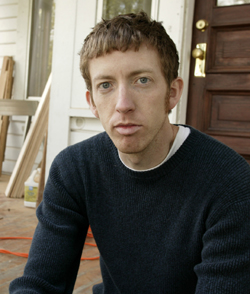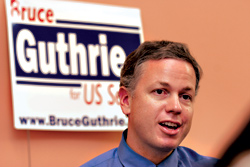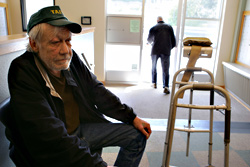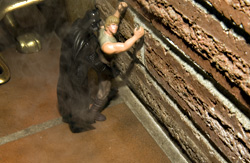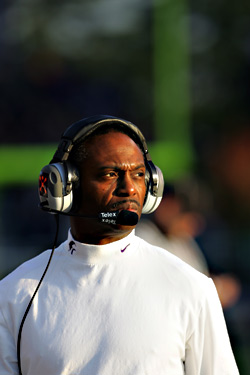Does political violence have a legitimate place in the peace movement? Definitely, says Craig Rosebraugh, a Portlander who has emerged as one of Americas leading voices of radicalized dissent. The threat to the life of the planet is so severe that political violence must be understood as a viable option, Rosebraugh said during a Seattle lecture two weeks ago. Its a line of thought the longtime activist has trumpeted throughout the Northwest and across the Internet in recent months.
And when Rosebraugh talks, people listen and actat least they do in Portland. By most measures, Oregons largest city is now the center of protest in the Pacific Northwest, a stark contrast to the anemic scene in Seattle. At times, peace protests in Portland have turned into violent clashes with police, much to the shock of many activists there who prefer the old-school, nonviolent Ghandian approach.
Rosebraugh says its time for a new school.
On March 28, Rosebraugh delivered a three-hour-long address to about 40 people at downtown Seattles Independent Media Center. In it, he said that, by itself, nonviolent protest in America has never worked to change government policy, not during the civil rights movement and not during the Vietnam War. Then he sketched a condensed history of political violence as was used during the Algerian revolution of 19541962. Political violence works, he said, and its a tactic that should be adopted by the left.
People need to at least consider if they are serious about stopping injustice perpetrated by our government, they need to be realistic about what its going to take to stop that injustice, Rosebraugh said in an interview. A variety of tactics should be considered, but they must include political violence.
Does political violence have a legitimate place in the peace movement?
Rosebraugh, who began his career as an activist protesting the first Gulf War, is one of the few thinkers advocating such an approach. As a result, he is very careful about what he says. He doesnt point to specific targets that ought to be blown up. Instead, in recent Internet postings, he writes that activists should target financial and media centers and engage in urban rioting in order to shut down the American economy, which, he says, is the prime engine behind the war in Iraq.
Rosebraugh doesnt call for political violence against specific targets. To do so would beg arrest. The Portlander has plenty of experience being targeted by law enforcement. From 1998 to 2001, he was the spokesperson for the secretive Earth Liberation Front. In that capacity, he received anonymous communiqu鳠from persons engaging in property destruction and claiming their acts in ELFs name. Rosebraugh then publicized the actions and conducted interviews with media, during which he disclaimed personal responsibility for the attacks and explained ELFs philosophy of doing economic damage to companies it saw as hurtful to the environment. ELFs largest single act was setting the 1998 arson fire at a ski lodge in Vail, Colo.
As a result, Rosebraugh became a target for law enforcement. The FBI and the Bureau of Alcohol, Tobacco, and Firearms twice raided his home. In Portland, a federal grand jury repeatedly called Rosebraugh to testify on his ELF activities, and the FBI regularly tailed him.
Still, the feds never charged Rosebraugh with any crimes. Rosebraugh stopped being ELFs spokesperson in 2001 to focus on graduate studies.
While any link between Rosebraugh and recent protests in Portland is unclear (although 300 people turned out there to hear him speak on political violence), it is clear that there is a new mood in the City of Roses. Only two years ago, protesters regularly marched peacefully, and the police largely cooperated even with unpermitted marches. But on March 20, during a confrontation at a Willamette River bridge, protesters physically engaged the police. One cop was hit with a bat and received 10 stitches as a result. The 5,000 protesters then went on to block three freeways and largely shut down Portlands retail district. At more recent marches, large crowds have gathered, and police have regularly pepper sprayed protesters with very little pretext, according to protesters and press accounts.
Whats more, many radical protesters have taken to blocking television cameras at protests and threatening reporters, a reaction against what they claim are the lies of the mainstream media. In a rare action in this country, Portland television and radio stations have responded by having armed guards accompany their reporters and camerapeople at protests.
To say the least, the mood is ugly in Portland, and the forces of reaction are showing their teeth. One Oregon state senator has introduced legislation to make any protester who blocks traffic or commerce subject to 25 years to life in prison (the bill is not expected to pass).
Some in Portlands traditionally intense activist community are furious with Rosebraugh.
Craig Rosebraugh is wrong, says Portland attorney Alan Graf of the local National Lawyers Guild chapter and a longtime activist.
It seems unlikely that Rosebraughs call will have an impact on Seattle. To date, protest activity here has been low-key and mostly nonconfrontational. There have been no reported acts of violence against Seattle police. Whats more, turnout at peace demonstrations has been slim since the war began, especially in light of the 30,000-plus who turned out for a Feb. 15 march at Seattle Center.
A protest is planned for noon April 12, beginning in Volunteer Park on Capitol Hill.
